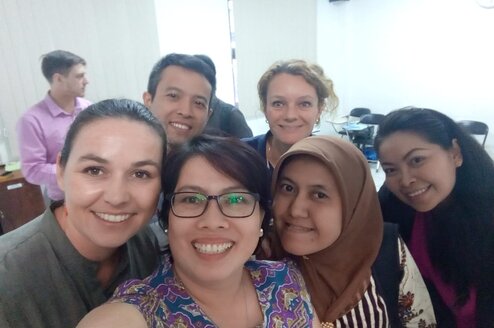Teach English in Jakarta, Indonesia
Programs
About
As both the capital of Indonesia -- a sprawling archipelago encompassing an estimated 17,000 individual islands -- and the largest city in Southeast Asia, Jakarta has been the center of the region’s rapid twenty-first century economic development. In fact, Jakarta took the top spot in Global Cities Index’s Emerging Cities Outlook 2014, an analysis of up-and-coming cities that are predicted to improve their global influence in the coming decades.
While Jakarta is not the nation’s primary tourist destination, the city is only a short flight away from the better-known islands of Bali and Sumatra. The bustling capital city itself has a rich history and contains a variety of museums and monuments for the curious tourist.
Knowledge of the English language is in vogue as Jakarta’s economy continues to surge. As a result, there is significant demand for native-speaking English teachers in the city.
Job Types
Private Language Schools
There are many, many opportunities for qualified teachers in private training schools. In fact, a majority of the results when searching for ESL jobs will bring up advertisements for two of the largest training schools in the industry: Education First (better known as EF) and Wall Street English.
Both companies – which have locations in dozens of countries – are well-established and offer top salaries, visa sponsorship, housing assistance and airfare reimbursements.
TEFL or TESOL certification and a bachelors degree are required for all foreign teacher positions.
Teaching for a private language school differs from international and public schools in one fundamental way: profit is key. The competition for English language training schools has skyrocketed in Asia over the past decade, and every company wants to make their mark. Consequently, training schools can offer substantial salaries to foreign teachers who demonstrate the ability to attract and retain students.
International Schools
Positions with international schools are not as prevalent as those with language training centers, but they certainly are possible to find.
These private schools, which typically contain students from grades K to 12, often require that applicants for ESL positions have a minimum of one-year teaching experience, a bachelor’s degree, a TEFL certification and, sometimes, experience teaching under the International Baccalaureate system.
However, salaries are usually above-average, and positions come with the added bonus of a Monday-Friday work schedule. Some of Jakarta’s well-known international schools include the Jakarta Multicultural School and the British School Jakarta.
Government-Sponsored Programs
Those who already have or are interested in obtaining advanced degrees in Teaching English as a Foreign Language can find some amazing positions in Jakarta through the U.S. Bureau of Educational and Cultural Affairs Exchange Program.
The programs span anywhere from two-week to 10-month long fellowships aiming to improve the English language skills of teens and university-age students. Information on application deadlines and benefits can be found on the website for the U.S. Embassy in Jakarta.
Finding a Job
When and Where to Look for Jobs in Jakarta
Private training centers are constantly adding new locations, so schools can be found across the city of Jakarta. On a related note, due to their constant expansion, training centers basically hire foreign teachers on a year-round basis.
Those interested in working for an international school may want to apply in August/September or December/January, so they can secure positions before the academic school year’s fall and winter semesters.
To make it easier to obtain the necessary work permit, applicants should look for positions before arriving in the country. Plenty of job postings can be found on ESL websites such as the Go Overseas job board and Asia Teaching Jobs.
Qualifications
International schools and reputable training schools will almost always require a TEFL/TESOL certification and a bachelor’s degree for foreign teachers. Some of the training schools may not be as stringent about the university degree, but the TEFL/TESOL certification may be required in order to receive a work visa.
Need to Know
Salary & Cost of Living
While Indonesia has a reputation for cheap living (at least, for Westerners), the cost of living is considerably higher in Jakarta. But even in Jakarta, prices for housing, transportation and basic goods are much lower than what could be found in Western countries.
Foreign teachers in Jakarta can initially expect to earn an average of 15,000,000 rupiahs per month (about $1,200). Some schools may provide shared housing in an apartment free-of-charge, while others will only provide assistance with the housing search.
Expats who aren’t overly concerned about budgeting can find beautiful apartments and houses for rent in Central and South Jakarta, some of the city’s most attractive and historical areas.
While many residences in these districts can be on the pricier side (sometimes more than $1,000 per month) it’s possible to find some smaller, affordable apartments in those districts as well. The neighborhood of Kuningan, in particular – part of the Central Business District – is a popular location for expats.
East Jakarta is a better match for expats on a modest budget. Although the district is a bit of a commute from the city’s downtown area, the neighborhoods are safe and far less expensive. With some searching, it is possible to find modern, one-bedroom apartments for around $400-$500 a month. There are several websites one can access to browse apartment listings, including Apartments Jakarta.
Dining out and transportation are inexpensive. As of 2014, the cost of typical meal out for two in a mid-range restaurant was $15. A coffee at a cafe costed less than $3, and imported beers at a bar ranged from $3 to $4.
Classroom & Work Culture
Jakarta is a twenty-first century city, and its citizens have likely had a good deal exposure to Western media and culture. Foreign teachers will not be entering completely unfamiliar terrain.
However, there are a few things to keep in mind. For instance, don’t be surprised if, during greetings, a handshake is followed up by an individual touching their heart. This is considered a respectful gesture that is especially used when greeting people in authoritative or official positions -- including teachers.
Like many other Asian countries, Indonesians are quite conscious of hierarchies. As a result, teachers are treated as authoritative figures deserving of respect and attention from their students.
Teachers should also demonstrate their respect of their students by wearing appropriate clothing in the classroom. Attire definitely doesn’t need to be formal – clean long-sleeved shirts and trousers for men, and long skirts and trousers for women are perfectly adequate.
One thing foreigners should prepare themselves for is the Indonesian perception of time, known as “rubber time.” Simply put, do not expect the same kind of punctuality that is considered the norm is Western countries. Time can be a relative idea.
While this may not always affect business situations, expats should keep this in mind when using public transportation. Busses and ferries may have an official “schedule,” but don’t expect that schedule to determine when those vehicles actually show up.
Contributed by Ashley Portero
New Teaching Jobs
View the latest teaching job postings on our job board.
Related Teach Abroad Articles
Frequently Asked Questions
-
Can you teach English in Indonesia without a degree?
By law, in order to teach English in Indonesia you will need a Bachelor's degree or a TEFL/TESOL certification. That being said, there are ways to teach without a degree, such as through volunteering programs.
Related Content -
How much do English teachers make in Indonesia?
The average salary for teachers in Indonesia is $650-$1,050 per month.














